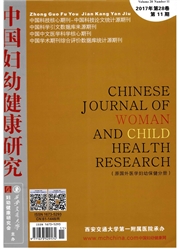

 中文摘要:
中文摘要:
多囊卵巢综合征是绝经前妇女的内分泌疾病,主要表现为高雄激素血症。多囊卵巢综合征患者雄激素的增加源于胰岛素抵抗及内脏脂肪组织代谢活性物质导致的高胰岛素血症。30%-75%多囊卵巢综合征患者体重过高。肥胖对多囊卵巢综合征的表现类型有显著影响,且与多囊卵巢综合征妇女不孕相关,也增加了多囊卵巢综合征患者发生代谢综合征及心血管疾病的危险性。该文就肥胖与多囊卵巢综合征相互影响的病理生理机制、肥胖对多囊卵巢综合征表现类型的影响,肥胖对多囊卵巢综合征患者发生代谢综合征及心血管疾病的影响及目前对多囊卵巢综合征肥胖患者治疗的新方案作以综述。
 英文摘要:
英文摘要:
Polycystic ovary syndrome (PCOS) is the most common endocrinopathy of premenopausal women and is characterized by hyperandrogenmia. For a substantial proportion of PCOS patients, primary deficiency in androgen secretion is triggered by factors such as hyperinsulinism resulting from insulin resistance and/or secretion of metabolically active substances by visceral adipose tissue. The prevalence of obesity in PCOS patients is increased as compared with general female population, and the prevalence of PCOS is increased in overweight and obese women as compared with those with normal body weight. Obesity exerts a major impact on phenotype of PCOS and is associated with infertility of the woman. Furthermore, obesity increases risks of metabolic syndrome and cardiovascular diseases of PCOS patients. This review summarized pathophysiological mechanisms underlying association of obesity with PCOS, impact of obesity on PCOS phenotype and association of obesity with metabolic disorders and cardiovascular diseases, and developments in treatment of obese PCOS patients.
 同期刊论文项目
同期刊论文项目
 同项目期刊论文
同项目期刊论文
 期刊信息
期刊信息
